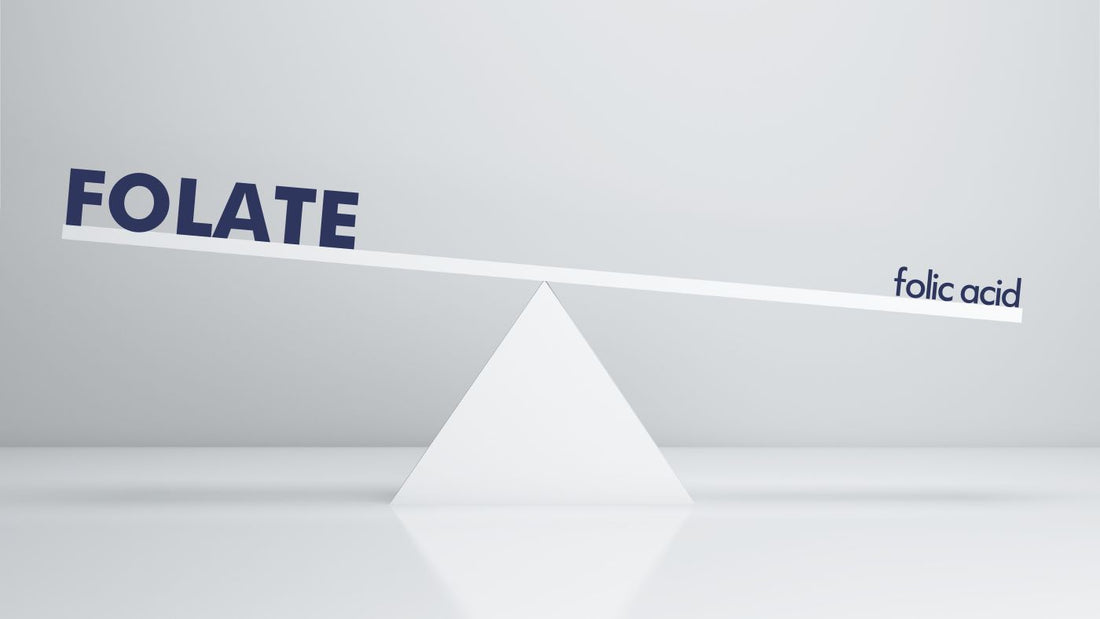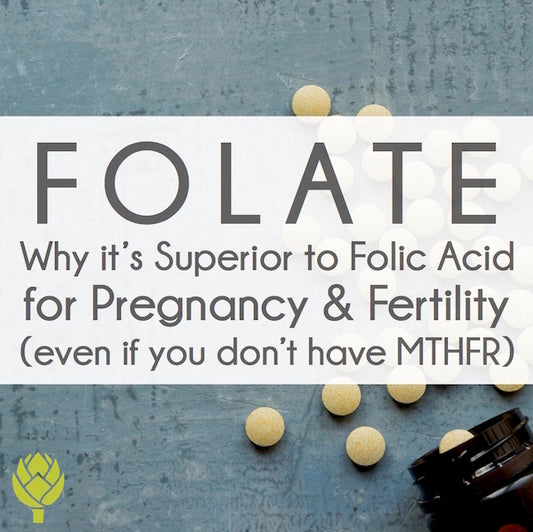8 Key Nutrients to Support Healthy Neural Tube Development
Read more

Folate, or vitamin B9, is a broad term encompassing various nutrient forms, including folic acid, methyl-folate, and folinic acid.
This prenatal essential plays a vital role in red blood cell production, amino acid processing, and DNA building, with its significance magnifying during early pregnancy as it influences healthy neural tube development, shapes the baby's brain, and forms the spinal cord.
The Food and Nutrition Board (FNB) recommends a Recommended Dietary Allowance (RDA) for folate of 600 mcg DFE during pregnancy, with research suggesting that many women may benefit from higher doses. DFE, which stands for dietary folate equivalents, is a way for people to see how natural folate sources compare to folic acid when it comes to absorption with one easy to understand number.
Bioavailability, measuring how effectively the body absorbs a substance, is crucial, especially during pregnancy. After all, we want to absorb and utilize the nutrients we consume.
Although conventional folic acid has been impactful due to late '90s public health initiatives, concerns arise about its bioavailability over the forms we see naturally occurring in food.
Understanding the controversy between methyl-folate and folic acid requires revisiting the late 1990s public health campaign promoting folic acid fortification.
Despite its success in reducing neural tube defects (birth abnormalities of the brain), folic acid poses challenges due to its lower bioavailability and potential for unmetabolized by-products.
That means you run the risk of not getting enough folate to meet your body’s needs as well as risks associated with “unmetabolized folate” or UMFA.
The impact of UMFA could vary among individuals based on their genetics and the quantity of folic acid obtained from fortified foods and supplements, potentially leading to adverse effects in some cases.
In fact, a 2015 research paper published in the reputable American Journal of Clinical Nutrition looking at UMFA in umbilical cord blood of newborns noted that:
“...Because of concerns over potential adverse health outcomes, the functional ramifications of the observed high concentrations of folate and UMFA in maternal fetal circulation in the current study warrant additional investigation. Specifically, the dose of folic acid in prenatal supplements should be reconsidered in light of our findings to provide the optimal health benefits to the growing fetus while avoiding undue risk.” (1)
It’s important to note that UMFA is only a concern with folic acid and not with methyl-folate or folinic acid.
Even though the terms folic acid and folate are used interchangeably, there are differences.
Folic acid is the synthetic form of folate introduced for purposes of mandatory fortification of the food supply in 1998.
Folic acid requires conversion to 5-MTHF for effective use, posing challenges for individuals with genetic variations.
Natural folate can be found in organ meats, leafy greens, citrus fruits, and legumes and differs in its conversion process in the body.
Our commitment aligns with FDA, NIH, and scientific research—supporting adequate folate intake inclusively.
Research increasingly supports higher levels of folate intake for overall reproductive health. We take pride in our robust folate levels in FullWell Prenatal and the forms they are in.
Numerous prenatal vitamins, including the top five best-selling brands in the United States, rely solely on folic acid, as indicated by sales data from 2019 and the trailing 12 months until April 2020.
This raises a fundamental question: given the prevalence of genetic variation and the National Institutes of Health's endorsement of 5-MTHF as a potentially more advantageous alternative, why persist with folic acid?*
*Based on the leading US prenatal multivitamin brands by 2019 & trailing 12-month retail sales (through April '20)
Several factors contribute to the continued use of folic acid. First, it has a 25+ year history of use, stemming from mandatory folic acid fortification of grain products in the late 1990’s.
Second, it is far less expensive than methyl folate or folinic acid, making it the most popular form of folate used in dietary supplements and the easiest to study form in pregnancy supplementation studies.
But does this mean it is the best form of folate to use in dietary supplements?
When comparing folic acid and methylated folate (5 MTHF) in pregnancy, it’s crucial to acknowledge them as separate variations of the same nutrient, folate.
Both contribute to maintaining adequate folate levels, a crucial factor in supporting healthy neural tube development during pregnancy.
The Food and Drug Administration (FDA), with substantial scientific concurrence from qualified health experts, asserts that sustaining sufficient folate intake can support normal neural tube development.
Importantly, the FDA rejects the notion that folic acid is the exclusive folate form for minimizing neural tube defect incidences.
The FDA states that the connection between diet and disease is better explained when we take into consideration all the natural forms of folate, not just the synthetic form we know as folic acid.
We support the FDA's perspective that encourages adequate folate intake to maintain sufficient levels, regardless of whether through folic acid or natural folate sources.* (2)
At FullWell, your health is our priority.
We purposefully chose to use L-5-methyl-tetrahydrofolate calcium (methyl-folate) and calcium folinate (folinic acid) in our Women's Prenatal.
These naturally occurring forms of folate, found in folate-rich foods, ensure maximum bioavailability, irrespective of genetics.
Consult your healthcare professional to tailor your prenatal nutrition and explore our Directory for qualified specialists.
